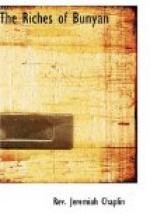Is there nothing in dark providences, for the sake of the sight and observation of which such a day may be rendered lovely, when it is upon us? Is there nothing of God, of his wisdom and power and goodness, to be seen in thunder and lightning, in hailstones, in storms and darkness and tempests? Why then is it said, he hath his way in the whirlwind and storm? And why have God’s servants of old made such notes, and observed from them such excellent and wonderful things? There is that of God to be seen in such a day, which cannot be seen in another. His power in holding up some, his wrath in leaving others; his making shrubs to stand, and his suffering cedars to fall; his infatuating the counsels of men, and his making the devil to outwit himself; his giving his presence to his people, and his leaving his foes in the dark; his discovering the uprightness of the hearts of his sanctified ones, and laying open the hypocrisy of others, is a working of spiritual wonders in the day of his wrath and of the whirlwind and storm.
These days, these days of trial, are the days that do most aptly give an occasion to Christians to take the exactest measures and scantlings of ourselves. We are apt to overshoot in days that are calm, and to think ourselves far higher and more strong than we find we are when the trying day is upon us. The mouth of Gaal, Judges 9:38, and the boasts of Peter, were great and high before the trial came; but when that came, they found themselves to fall far short of the courage they thought they had. We also, before the temptation comes, think we can walk upon the sea; but when the winds blow, we feel ourselves begin to sink. Hence such a time is rightly said to be a time to try us, or to find out what we are; and is there no good in this? Is it not this that rightly rectifies our judgment about ourselves, that makes us to know ourselves, that tends to cut off those superfluous sprigs of pride and self-concitedness, wherewith we are subject to be overcome? Is not such a day the day that bends us, humbles us, and that makes us bow before God for our faults committed in our prosperity? And yet doth it yield no good unto us? We could not live without such turnings of the hand of God upon us.
Thine own doubts and mistrusts about what God will do and about whither thou shalt go, when thou for him hast suffered awhile he can resolve, yea, dissolve, crush, and bring to nothing. He can make fear flee far away, and place heavenly confidence in its room. He can bring invisible and eternal things to the eye of thy soul, and make thee see that, in those things in which thine enemies shall see nothing, that thou shalt count worth the loss of ten thousand lives to enjoy. He can pull such things out of his bosom, and can put such things into thy mouth; yea, can make thee choose to be gone, though through the flames, rather than to stay here and die in silken sheets. Yea, he can himself come near, and bring his heaven and glory to thee. The Spirit of glory and of God resteth upon them that are but reproached for the name of Christ. And what the Spirit of glory is, and what is his resting upon his sufferers, is quite beyond the knowledge of the world, is but little felt by saints at peace. They that are engaged, that are under the lash for Christ—they, I say, have it, and understand something of it.




